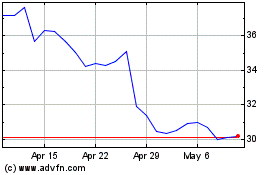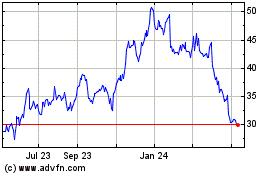Intel Agrees to Sell Majority Stake in Security Unit to TPG -- Update
September 07 2016 - 7:05PM
Dow Jones News
By Dana Mattioli, Matt Jarzemsky and Don Clark
Intel Corp. agreed to sell a majority stake in its
computer-security unit to private-equity firm TPG, partly reversing
a five-year-old acquisition that has largely proved
disappointing.
TPG will take a 51% stake in the business in a deal that values
it at $4.2 billion including debt, Intel said in a statement
Wednesday confirming an earlier report in The Wall Street Journal.
The business, recently called Intel Security, will use the McAfee
name originally associated with it.
Intel's security business was originally known for antivirus
programs. But it has branched into other varieties of software
aimed at preventing attackers from breaking into corporate
networks. In the first half revenue rose 11% to $1.1 billion.
Intel bought McAfee for $7.7 billion in 2011 as the chip giant
sought to diversify. It paid a lofty 60% premium, causing some
analysts to worry the technology giant was overpaying and moving
too far beyond its expertise in designing computer chips.
The move is now generally regarded as a disappointment. Intel,
which has long looked for successful franchises beyond the chips
for personal computers on which it built its fortune, originally
characterized the McAfee transaction as a promising source of
additional profits. Intel executives talked up the possibility of
using expertise from McAfee to build more security features into
chips.
As part of Wednesday's deal, TPG is making a $1.1 billion
investment to help the business expand further and sharpen its
focus, Intel said.
McAfee has drawn controversy lately. It took its name from
co-founder John McAfee, an entrepreneur who sold his interest in
its key assets in 1991. He recently filed a suit in U.S. District
Court in New York against Intel, seeking a declaration that he has
the right to use his name in connection with security products.
Intel had warned him in a letter that his use of the name would
constitute a trademark violation. Intel had recently de-emphasized
the McAfee name in favor of what it calls Intel Security.
In April, Intel said it would slash 12,000 jobs, 11% of its
workforce, partly due to the chip maker's failure to take advantage
of the industry's transition to smartphones. The restructuring was
Intel's largest in terms of the number of employees affected.
The continuing decline in personal computers has forced Intel to
focus on growth areas such as computers for data centers and
non-computer devices outfitted with data-processing and
communications capabilities, known as the Internet of Things. Intel
is also expecting growth to come from selling chips for servers and
other gear related to cloud computing.
Last year, Intel completed the $16.7 billion acquisition of
Altera Corp., its largest acquisition ever. Altera's chips are used
in an array of devices that include networking equipment. The deal
came on the heels of several other major deals among semiconductor
companies.
The McAfee deal would add to an active market for technology
mergers broadly, a trend underlined by privately held PC maker
Dell's combination with EMC, which closed Wednesday. Cybersecurity
assets have also been changing hands. Symantec Corp. in June agreed
to buy Blue Coat Systems Inc. in a $4.65 billion deal.
The sector has also provided fertile ground for private-equity
firms, which otherwise have struggled to find chunky acquisitions
amid competition from corporate buyers and tighter bank regulations
that have kept a lid on financing. Year-to-date, private-equity
firms have put $33.8 billion into U.S. leveraged buyouts in the
tech sector, or 49% of all buyout volume, according to
Dealogic.
The deal marks TPG's boldest bet yet on the need for protection
from increasingly sophisticated hacking attacks. Last year, the
firm led a $100 million investment in internet security company
Zscaler Inc. and a $120 million funding round for security and
information technology vendor Tanium. Unlike those smaller
investments in relatively new technology providers, McAfee gives
entree to a host of corporate customers and a platform to make
additional and potentially larger deals in cybersecurity.
TPG, founded in 1992 and with over $70 billion of assets, also
has a long history of investing in units of larger companies, In
2005, it took a stake in Lenovo Group Ltd. to finance the Chinese
computer company's purchase of International Business Machines
Corp.'s PC unit. In 2002, it participated in a $2.26 billion deal
to buy Burger King from consumer-goods conglomerate Diageo PLC.
Write to Dana Mattioli at dana.mattioli@wsj.com, Matt Jarzemsky
at matthew.jarzemsky@wsj.com and Don Clark at don.clark@wsj.com
(END) Dow Jones Newswires
September 07, 2016 18:50 ET (22:50 GMT)
Copyright (c) 2016 Dow Jones & Company, Inc.
Intel (NASDAQ:INTC)
Historical Stock Chart
From Mar 2024 to Apr 2024

Intel (NASDAQ:INTC)
Historical Stock Chart
From Apr 2023 to Apr 2024
